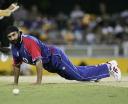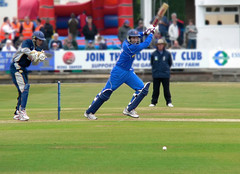Why everyone wants to bat in the middle order (and what to do about it)
35 Ways to improve your cricket during the season

 photo credit: Spoungeworthy
photo credit: SpoungeworthyBack in the mists of ancient history (the 1980's) the Soviets were kings of sport. Their state funded athletes became a huge experiment in maximising performance.
This included the development of periodisation: the planning system that most sports follow to this day, cricket included.
You can’t improve what you don’t measure
Cricket is a statisticians dream. Every aspect of a cricketer's performance is measured by statistics. The great players are often separated from the good players based on statistics.
For those that did not get a chance to witness the great Don Bradman bat, the only way they know he was perhaps the best batsman that ever lived was in is amazing batting average of 99.94.
5 ways Ferris Bueller can improve your cricket

Ferris would have been a great cricketer, had he not been busy being a 1980's fictional Amercian High school kid. Here's why.
Ferris uses bluff to his advantage
Aussie View: Selecting a club batting line up
Brisbane cricketer, Simon Eggins is back with his view on club cricket from the other side of the world.
Getting the right batting order can be a tough job for a club captain.
Sometimes it's useful to experiment with different possibilities. Batsmen generally perform better when given the chance to get comfortable batting in one spot for an extended period.
Do you feel guilty about your fielding?
 Fielding is one guilt ridden pastime for most club cricketers. We feel bad because you don't practice it enough even though we know how important it is.
Fielding is one guilt ridden pastime for most club cricketers. We feel bad because you don't practice it enough even though we know how important it is.
Let's face it, fielding drills ain't as much fun as batting or bowling.
On top of this, the focus professionals have on their own fielding skills has generated a number of new fangled theories to improve further.
Warning: Are you using these 7 club cricket clichés?
As a coach the cliché; is my best friend and my worst enemy. The easy to digest truism slips of the tongue when working with players, especially groups. But are they doing more harm than damage to players?
Let's take a look at some common clichés and decide.
- Never run on a misfield. Richie Benaud still maintains this as gospel truth. The reality is less clear. If the ball goes straight through a players legs you can probably take another run safely. On the other hand it's often best for club players to avoid getting suckered by a fumble. If you are particularly fast and a good judge of a run you can run off a misfield but it's a risky business so if you decide to go only every put yourself at risk of getting run out.
5 ways to think faster on the field
If you have ever captained at any level you know how fast cricket can move even if things seem to be going slowly.
The ability to think fast is vital. If you can process a large amount of game information and turn it into a relevant tactical move in a ball or two rather than an over or two it stands to reason you will win more games.
ECB Batting tips: How to score more runs
 One of my top secret weapons to keeping as up to date as possible is getting the resources from the ECB Coaches Association. If you are an ECB coach you will know what I mean.
One of my top secret weapons to keeping as up to date as possible is getting the resources from the ECB Coaches Association. If you are an ECB coach you will know what I mean.



